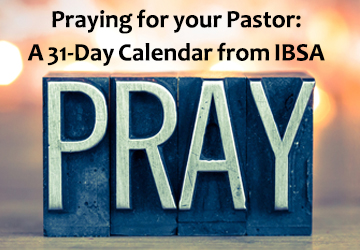By Nate Adams
This month it is my privilege to officiate the wedding ceremony of our youngest son, Ethan, and his fiancée, Alyssa. They will be married in Elgin, where they first met as Judson University students six years ago, and where my wife, Beth, and I also met more than forty years ago.
Our middle son, Noah, is also married to an Alyssa, and so we will gladly navigate that potential confusion at family get togethers. They met in high school, however, here in Springfield, not long after I came to serve at IBSA.
And our oldest son, Caleb, literally met his wife, Laura, at IBSA. They were in high school at the time, though it wasn’t until a few years later that they reconnected for good. Both Laura’s mom, Melissa, and I worked at IBSA. One summer we dragged our two reluctant college students to the IBSA family picnic. They started writing letters, and now they’ve been married six years.
Especially as parents who mainly know boys, Beth and I are so grateful for these three young ladies who have become our daughters. All are devoted Christ-followers who love the Lord and are active with our sons in local Baptist churches. Each one is delightful, gifted, and unique. And we are especially blessed with the genuine friendship these six young adults have with one another—and with us.
And so, I want to say thank you. Thank you first to the Lord, of course, who sovereignly brought these three couples together in his perfect timing. But thank you also to the IBSA Board and the larger Illinois Baptist family, who more than thirteen years ago called me to bring a wife, three teenage sons, and a slightly quirky dog to serve the churches of Illinois. As I occasionally remind each of our sons, we have prayed for their future wives since before they were born. As it turns out, all of them were here in Illinois.
As our youngest son marries, I’m finding grace in unlikely places.
As we discussed wedding preparations, each of our sons and their fiancées asked me to make sure that their marriage ceremonies contained clear gospel presentations. They asked me to underscore that Christ is the center of their relationships, and that by his grace he will be the lifelong foundation of their marriages. What a privilege it is to prepare a marriage ceremony with that charge.
There were a number of challenging topics that I considered writing about this month. The Southern Baptist Convention will convene in Birmingham and face several difficult issues, including recent accusations of sex abuse in churches and even by missionaries. Leaders will seek the best paths forward for effectively helping prevent the travesty of sex abuse in churches.
Also, at the end of their May session, the Illinois legislature approved the “Reproductive Health Act” that legalizes abortion through nine months of pregnancy, requires all insurance to cover abortions, and allows nurse practitioners to perform abortions. This appalling legislation is a major setback to the pro-life movement in Illinois. The action stands in stark contrast to recent legislation in states including Missouri, Georgia, and Alabama that have sought to limit or end abortion.
So it’s a tough month for Southern Baptists in Illinois. But right in the middle of that, I get to celebrate this wedding, this testimony to the gospel message and to Christ and his church. I get to welcome this wonderful young lady into our family, and watch our son be welcomed into hers. And I get to remember that God called me here to this often tough Midwest mission field, and that his grace and provision are still evident, in at least three Illinois girls.
Nate Adams is executive director of the Illinois Baptist State Association. Respond at IllinoisBaptist@IBSA.org.













 Today many churches across the state will collect the Mission Illinois Offering. With a goal of $475,000, the ministries in this prayer guide depend on faithful giving in order to continue reaching people for Christ. The Mission Illinois Offering is the most direct channel through which Illinois Baptists can fund mission work close to home and really invest in the things important to us here.
Today many churches across the state will collect the Mission Illinois Offering. With a goal of $475,000, the ministries in this prayer guide depend on faithful giving in order to continue reaching people for Christ. The Mission Illinois Offering is the most direct channel through which Illinois Baptists can fund mission work close to home and really invest in the things important to us here.